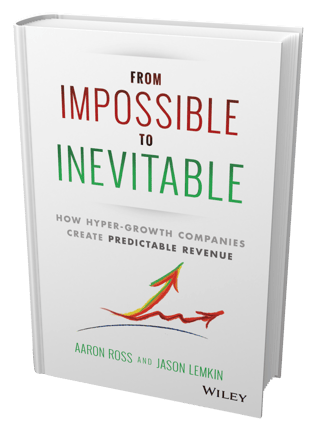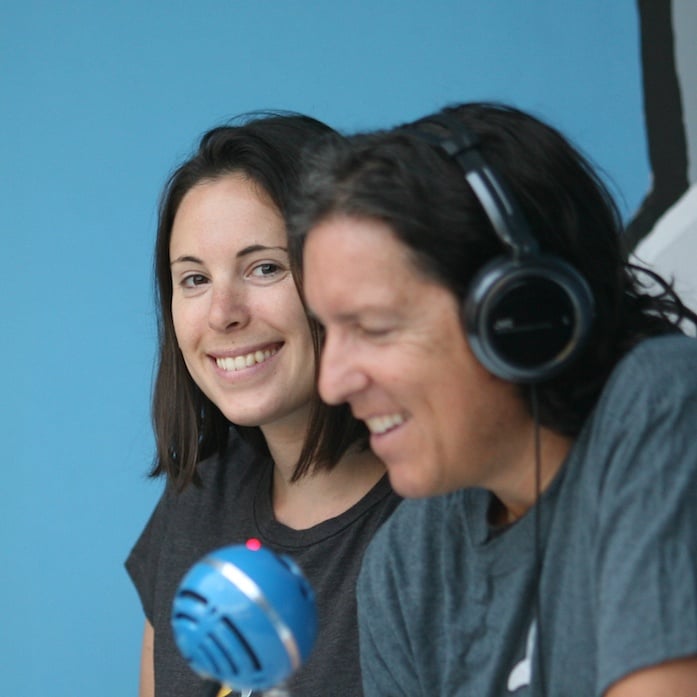Aaron Ross joins Helping Sells Radio for Episode 14. Aaron, with co-author Jason Lemkin, recently published a new book, From Impossible to Inevitable: How Hyper-Growth Companies Create Predictable Revenue, which is a follow-up to the widely read and implemented book Predictable Revenue, which has been called the sales bible of Silicon Valley. Sarah and Bill talk to Aaron about two main topics. First, we talk about why we should not tell people what we do for a living, but describe how we help people. Second, we talk about the new book.

Below is a brief summary of some of they points we discuss during the show.
How do you help people?
According to Ross, one of the biggest mistakes people make is focus too much on what they do for a living. Instead, people (and companies) should focus not on what I do, but on what I do for you. For example, instead of explaining to people what we do for a living, we should explain what do to help people. For example, instead of telling people, "I am a sales trainer," say, "I help sales people improve sales."
the next time someone asks you “what do you do?” pretend they said “how do you help people?” #mondaymotivation
— Aaron Ross (@motoceo) January 4, 2016
Much better.
Ross suggests a mental trick to get into this habit. When someone asks you, "What do you do?" Pretend they asked, "How do you help people?" Then, answer that question.
Try it. It works.
Why did you see the need to write From Impossible to Inevitable?
Then we started talking about Aaron's new book. From Impossible to Inevitable. We asked him why he felt the need to write this book, with co-author Jason Lemkin. Aaron talked about a natural progression from Predictable Revenue to Impossible to Inevitable. During work with his clients on predictable Revenue, may questions were raised: Why companies grow? Why do some struggle? What are the patterns? From Impossible to Inevitable goes beyond a predictable sales process and covers a broader perspective on how companies can set themselves up to be ready to grow and then execute on that.
This discussion led into two specific parts of the book, which are two important steps in the growth process: Nail you niche and Close the Trust Gap.
Nail Your Niche
One important question addressed in the book is, "Why aren't you growing?" Ross explains that the most common reason is that a company is just not ready to grow. And that is mostly a function of not nailing its niche. Many companies are not focused enough and do not select a small enough market in which it can win.
For example, data analytics companies can sell to any company. And many do. What many should be doing to ready themselves to grow quickly is nail its niche. Instead of selling data analytics to businesses, an analytics company should specialize to analytics for mid-sized dental practices in the north east to start. Nail that niche. Win in that market. Then grow from there.
Think about it this way:
- Amazon.com started with books
- Salesforce with sales automation
- Zappos shoes
- Facebook started with Ivy League schools
Yes. Companies can and should have grand visions, but they should start with where they can win.
There are exercises in the book, but these exercises also can be downloaded from the book website.
Click to Tweet:
The devil is in the details of customer success.
The trust gap and how to close It.
Another reason that prevents companies from growing is the trust gap and a company's inability to close the gap. Ross explains that it is one thing to sell your product to early adopters and to customers who know and trust you (your company, your brand, etc). It is another thing entirely to sell to markets where no one has every heard of you. Since they have never heard of you, there is no trust. You need to build that trust. Only after you close that trust gap, will your company be ready to grow big.
We asked Aaron how companies can close the trust gap and referred to a passage in the book:
"Hypergrowth comes from focusing on where you have the best chance of winning customers, making them successful, building a reputation of tangible results, and then growing from there."
If you help existing customers be successful. Not only will those customers renew at higher rates, but it will be easier to get referrals and tell stories through case studies, which build trust in other company who will begin to say, "Well, of they can help that company, they can probably help us."
That is closing the trust gap.
Anyway, we cannot spill all of the beans. You should listen to the entire podcast to get the details. And also get the book. See below to find out how to learn more about Aaron's work.
Get the book and learn more
To learn more about the book, get a free chapter, and buy it, go to: Fromimpossible.com
And for a more in-depth look at the methodology and how to apply it on your company, check out PredictableUniversity.com
Tell us what you think of Helping Sells Radio
You could:
- Write a review on iTunes.
- Publish some tweets using the hashtag #HelpingSells
- Comment below.
Thanks for listening to the show.




